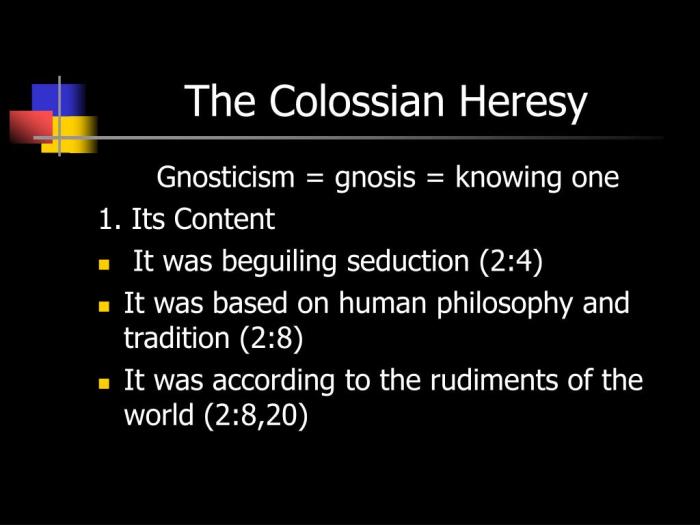The Colossian heresy emphasized what? This question takes center stage as we delve into the historical context, central tenets, and impact of this significant movement that challenged the unity and authority of the early Church.
The Colossian heresy emerged within a complex religious and social landscape, influenced by factors such as the rise of angel worship and the influence of Gnostic beliefs. Its central tenets distinguished it from orthodox Christianity, including the elevation of angels as intermediaries between God and humanity and the rejection of the full divinity of Christ.
Explain the historical context of the Colossian heresy.
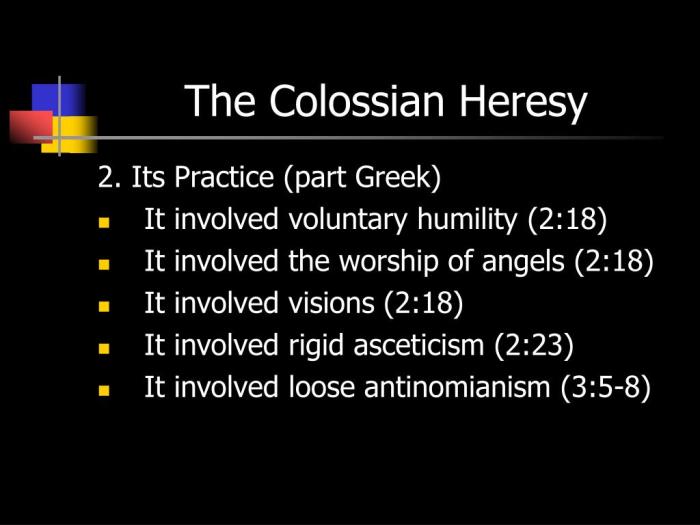
The Colossian heresy was a religious movement that emerged in the first century AD in the city of Colossae, in the Roman province of Asia (modern-day Turkey). The heresy was a syncretic blend of Jewish, Christian, and Gnostic beliefs. It taught that Jesus Christ was not fully divine, but rather a created being who was subordinate to the Father.
The heresy also taught that salvation was achieved through asceticism and the worship of angels.
The Colossian heresy was a major threat to the early Christian church. It challenged the core beliefs of Christianity and threatened to divide the church. The apostle Paul wrote a letter to the Colossians in response to the heresy. In the letter, Paul defended the deity of Christ and the sufficiency of his sacrifice for salvation.
He also warned the Colossians against the dangers of the heresy.
Timeline of key events, The colossian heresy emphasized what
- 49-50 AD: Paul’s first visit to Colossae
- 60-62 AD: Paul’s second visit to Colossae
- 60-62 AD: The Colossian heresy emerges
- 60-62 AD: Paul writes the letter to the Colossians
- 62-63 AD: Paul is imprisoned in Rome
- 64 AD: Paul is executed in Rome
Religious and social factors that contributed to its development
The Colossian heresy emerged in a context of religious and social change. The Roman Empire was a melting pot of cultures and religions. People from all over the empire came into contact with new ideas and beliefs. This led to a great deal of religious syncretism, as people blended different beliefs and practices into new religious movements.
The Colossian heresy was also influenced by social factors. Colossae was a wealthy city, and its inhabitants were exposed to the latest ideas and fashions. This created an environment in which new religious ideas could flourish.
Identify the central tenets of the Colossian heresy
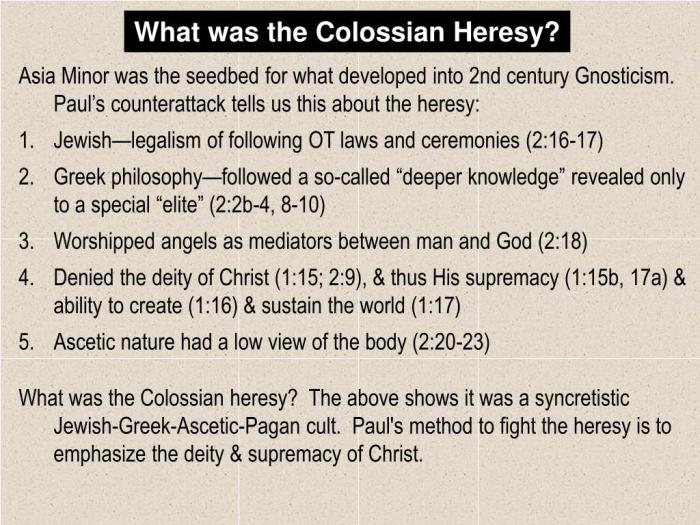
The Colossian heresy, a significant theological movement in the early Christian Church, was marked by a unique set of beliefs and practices that diverged from orthodox Christianity. This heresy emerged within the Church of Colossae, a city in Phrygia, and gained prominence during the 1st century AD.
The central tenets of the Colossian heresy included:
Angel Worship
Angel worship, a prominent feature of the Colossian heresy, involved the veneration and worship of angels. The adherents of this heresy believed that angels played a central role in the creation and governance of the world, and that they deserved to be honored and worshipped alongside God.
This practice was a significant departure from orthodox Christianity, which emphasized the worship of God alone.
Discuss the arguments against the Colossian heresy.: The Colossian Heresy Emphasized What
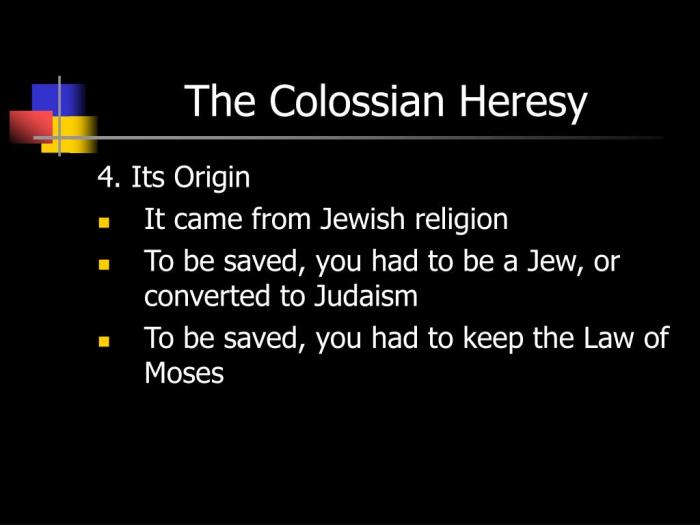
The Colossian heresy, confronted by the Apostle Paul, faced criticism on multiple fronts. Its teachings were scrutinized both theologically and philosophically.
Theological critiques
Theological critiques centered on the heresy’s departure from core Christian doctrines. The heresy elevated angels and other celestial beings to a status equal to or even above Christ, diminishing his unique position as the Son of God and Savior. This contradicted the central tenet of Christianity that salvation is found solely through faith in Christ.
Philosophical critiques
Philosophically, the heresy was criticized for its reliance on esoteric knowledge and mystical practices. Its emphasis on secret traditions and the worship of created beings was seen as incompatible with the simplicity and clarity of the Christian message. The heresy’s focus on asceticism and dietary restrictions was also seen as unnecessary and legalistic.
The role of the Apostle Paul
The Apostle Paul played a crucial role in combating the Colossian heresy. In his letter to the Colossians, he forcefully refuted the heretical teachings, emphasizing the supremacy of Christ and the sufficiency of his sacrifice for salvation. Paul urged the Colossians to reject the false teachings and remain steadfast in their faith.
Examine the impact of the Colossian heresy on early Christianity.
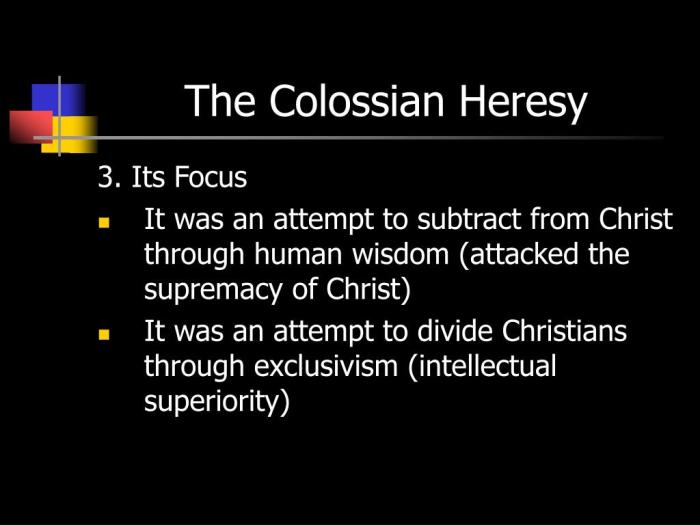
The Colossian heresy, which emerged in the first century CE, posed significant challenges to the unity and authority of the early Christian Church. It influenced the development of Christian doctrine and practice, leaving a lasting impact on the religion.
Challenges to Unity and Authority
The Colossian heresy undermined the authority of the apostles and the unity of the Church. Its proponents rejected the teachings of Paul and other apostles, claiming that they were not the true messengers of Christ. This led to divisions within the Christian community, as some believers embraced the heretical teachings while others remained loyal to the apostolic tradition.
Influence on Doctrine and Practice
The Colossian heresy also influenced the development of Christian doctrine and practice. Its proponents emphasized the importance of asceticism, denying the resurrection of the body and advocating for strict adherence to Jewish dietary laws. These teachings challenged the emerging orthodoxy of the Church, which emphasized the importance of grace, faith, and the resurrection of the body.
FAQ Overview
What were the key events in the development of the Colossian heresy?
The Colossian heresy emerged in the 1st century CE, influenced by religious and social factors in the city of Colossae. Its development was marked by the spread of angel worship and the influence of Gnostic beliefs.
How did the Colossian heresy differ from orthodox Christianity?
The Colossian heresy emphasized angel worship and rejected the full divinity of Christ. It also incorporated elements of Gnosticism, including the belief in a hidden knowledge accessible only to a select few.
What role did the Apostle Paul play in combating the Colossian heresy?
The Apostle Paul wrote the Epistle to the Colossians, which addressed the teachings of the Colossian heresy. In this letter, Paul emphasized the supremacy of Christ and the rejection of angel worship.

